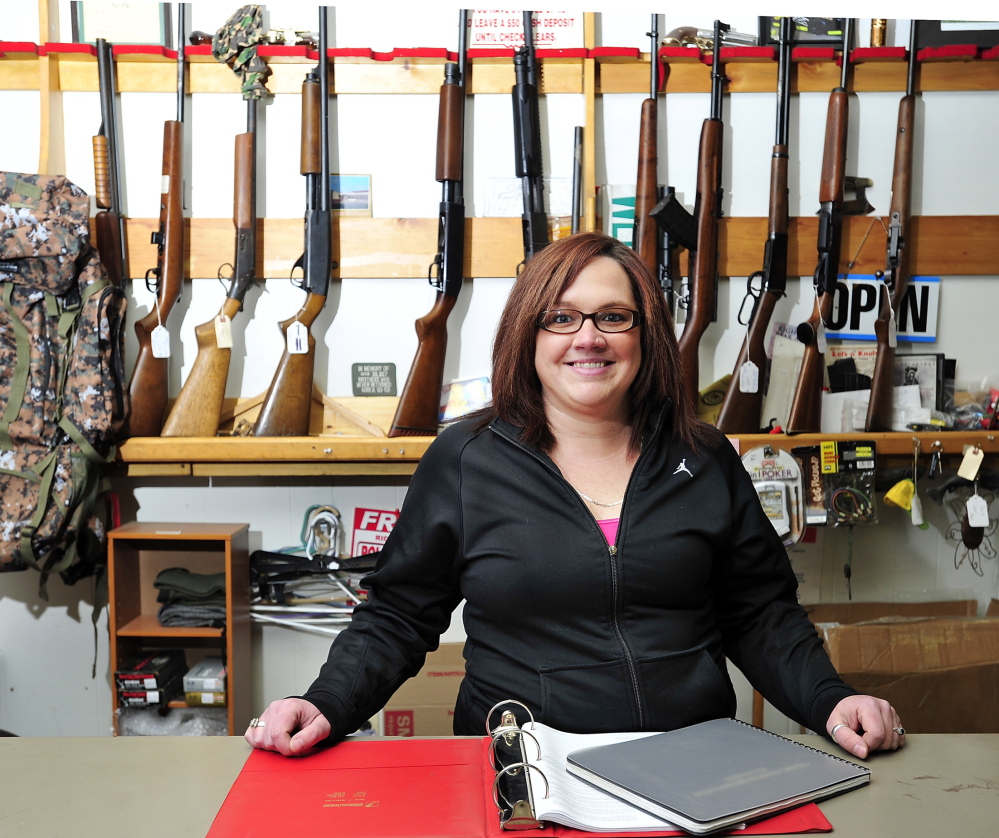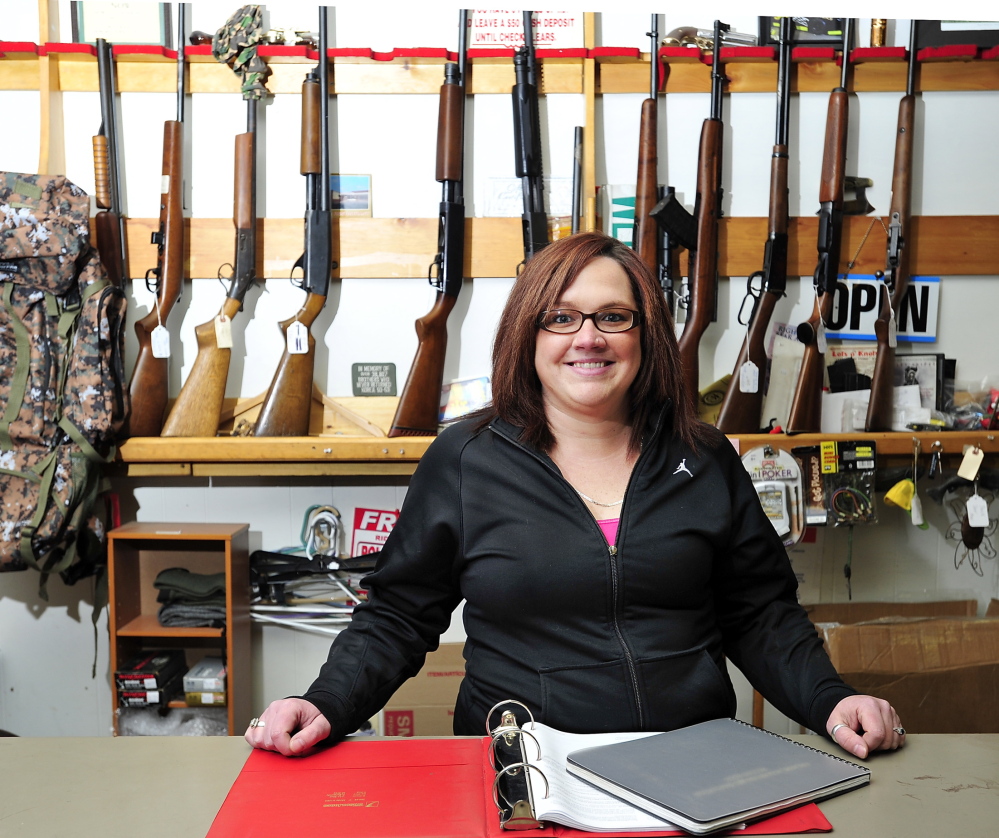Although a Sanford gun shop owner fighting an order to revoke his license claims federal agents overreached when they conducted a compliance inspection in his store, other gun dealers in Maine say the inspection is routine and they have not had problems with agents.
The Bureau of Alcohol, Tobacco, Firearms and Explosives moved to revoke the license of Pac N Arms and its owner, Phil Chabot, in February after Chabot allegedly prevented an inspector from copying or photographing certain records. A hearing on the proposed revocation has not been scheduled.
The ATF got a warrant to search Chabot’s store in February. Court records indicate he is suspected of making “straw sales” to a convicted felon who was barred from buying or possessing guns.
Chabot has not been charged and the ATF would not confirm that he is being investigated.
Ralph Sleeper, owner of Fine Line Gun Shop in Poland, said he has had two inspections from ATF agents since opening in 1989. He said it can be a long process for the investigator to review all of the sales records and inventory.
“Everything has to jibe. It’s almost impossible not to make a little mistake,” he said. “But it’s the bad stuff they’re looking for.”
Sleeper said he would be concerned, however, if an investigator was copying every record without a specific reason.
“Just to come in and copy every record, I don’t think that should be allowed,” he said.
That is what Chabot claims occurred at his store in August, when ATF investigator Wayne Bettencourt visited Pac N Arms to conduct a compliance inspection. According to a search warrant affidavit, Bettencourt said Chabot prevented him from copying certain records, even after he was warned that could cost him his license.
Bettencourt said he needed to copy the records to document Chabot’s violations and to follow up on people whose purchase patterns seemed suspicious.
Chabot’s attorney, Penny Dean, said her client believes the agent was acting improperly because he appeared to be scanning a copy of every page. Chabot has not been notified of any alleged violations, she said.
The federal Gun Control Act allows the ATF to conduct one warrantless annual compliance inspection of a federal firearms licensee.
Investigators review records, the inventory of guns and the licensee’s conduct of business. Debora Seifert, spokeswoman for the ATF’s Boston division, said investigators are allowed to copy records they believe may contain errors and those that could be used as evidence in a criminal investigation.
Andrew Molchan, director of American Firearms, a Florida-based association of about 7,000 firearms retailers nationwide, said it’s rare that a dealer would refuse to release records to the ATF.
“It doesn’t happen very often,” Molchan said. “You get your federal firearms license, you’re going to have all your records open to the ATF. That’s all crystal clear.”
Michael Marsh, owner of Mike’s Guns and Supplies in Lewiston, said he had his first compliance inspection last year after 25 years in business and was found to be in “complete compliance.”
“They actually took the time to give you a rundown or lesson in how your transactions should be handled and how your paperwork should be filled out,” Marsh said.
L.L. Bean, one of the largest sporting goods retailers in the state, has no objection to sharing its records with the ATF or allowing inspectors to make copies, spokeswoman Carolyn Beem said in an email.
Ashley Preble, manager of Webster’s Trading Co. in Auburn, said the staff works closely with the ATF on annual inspections and always complies with the investigator’s request to copy records believed to contain mistakes. The store also cooperates when ATF agents investigating a crime ask for a Form 4473, which people fill out when buying a gun.
“If they call us and need a copy of the 4473, we’re going to send it to them,” Preble said.
If violations are discovered, the agency issues a report on correcting the problem. If the problem is still not corrected, the ATF will issue a letter and can hold a warning conference with the licensee.
“On rare occasions, ATF encounters a licensee who fails to comply with the laws and regulations and demonstrates a lack of commitment to improving his or her business practices,” Seifert said. “In these cases, ATF has an obligation to protect the public and that may require revoking the federal firearms license.”
In fiscal year 2012, there were 69,000 federal firearms licensees in business nationally. During that time, the ATF did more than 13,100 compliance inspections, finding half of them in compliance. The ATF revoked or declined to renew 67 licenses – one half of 1 percent of all licenses.
In the last five years, the agency has moved to revoke the federal licenses of four firearms dealers in Maine, including Chabot.
The revocations, which ATF says typically involve a violation of laws regulating gun sales, represent a small portion of the 600 federal firearms licensees in Maine.
“It all comes back to keeping firearms out of the hands of those who shouldn’t have them, who will use them for nefarious reasons,” Seifert said.
The agency moved to revoke the license of Richard Suydam of Rumford in 2011 after he was accused of losing his record book of acquisitions and dispositions covering 1989 to 2002 and then later losing a subsequent record book covering 2002 to 2009.
In 2012, so-called straw purchases at Pac N Arms led to the convictions of three people, including a felon who admitted that he had his wife and a friend buy and sell guns for him while he was at Pac N Arms. Anthony Foglio of Waterboro pleaded guilty to being a felon in possession of a firearm and is serving 70 months in prison.
Knowingly selling guns to a convicted felon through a straw sale is a violation, according to the ATF.
The ATF would not say whether authorities seized the two handguns that Chabot sold to Foglio’s wife, Katelyn Malcolm, and his friend, Devon Ayotte. Chabot sold Ayotte a Rock Island Arms .38-caliber revolver on May 27, 2012, and sold Malcolm a Ruger 9mm semi-automatic handgun on May 30, 2012, according to court records.
Seifert said she still could not comment on what happened to the guns in those cases.
“That case is actually still open,” she said. “It’s part of a larger investigation.”
Seifert said she could not provide specific information on the other two Maine cases in which the ATF sought revocation of federal licenses, because there appeared to be no public records associated with them.
Another firearms group, Gun Owners of America, says it has heard from licensed dealers claiming that the ATF has copied all of their records of gun sales.
“We do hear from all over, not just Maine, that ATF agents doing these compliance inspections are asking for too much,” said Erich Pratt, spokesman for Gun Owners of America. Pratt said the agency shouldn’t be copying records unless there is a particular criminal case under investigation.
The organization’s foundation sometimes offers legal assistance to dealers and gun owners who have gotten into trouble with the ATF.
“We’re trying to protect people from overzealous prosecution,” Pratt said. “We’re not protecting people who we think have committed (a) crime.”
Gillian Graham can be contacted at 791-6315 or at:
ggraham@mainetoday.com
David Hench can be contacted at 791-6327 or at:
Twitter: @Mainehenchman
Scott Dolan can be contacted at 791-6304 or at:
sdolan@pressherald.com
Twitter: @scottddolan
Send questions/comments to the editors.




Success. Please wait for the page to reload. If the page does not reload within 5 seconds, please refresh the page.
Enter your email and password to access comments.
Hi, to comment on stories you must . This profile is in addition to your subscription and website login.
Already have a commenting profile? .
Invalid username/password.
Please check your email to confirm and complete your registration.
Only subscribers are eligible to post comments. Please subscribe or login first for digital access. Here’s why.
Use the form below to reset your password. When you've submitted your account email, we will send an email with a reset code.